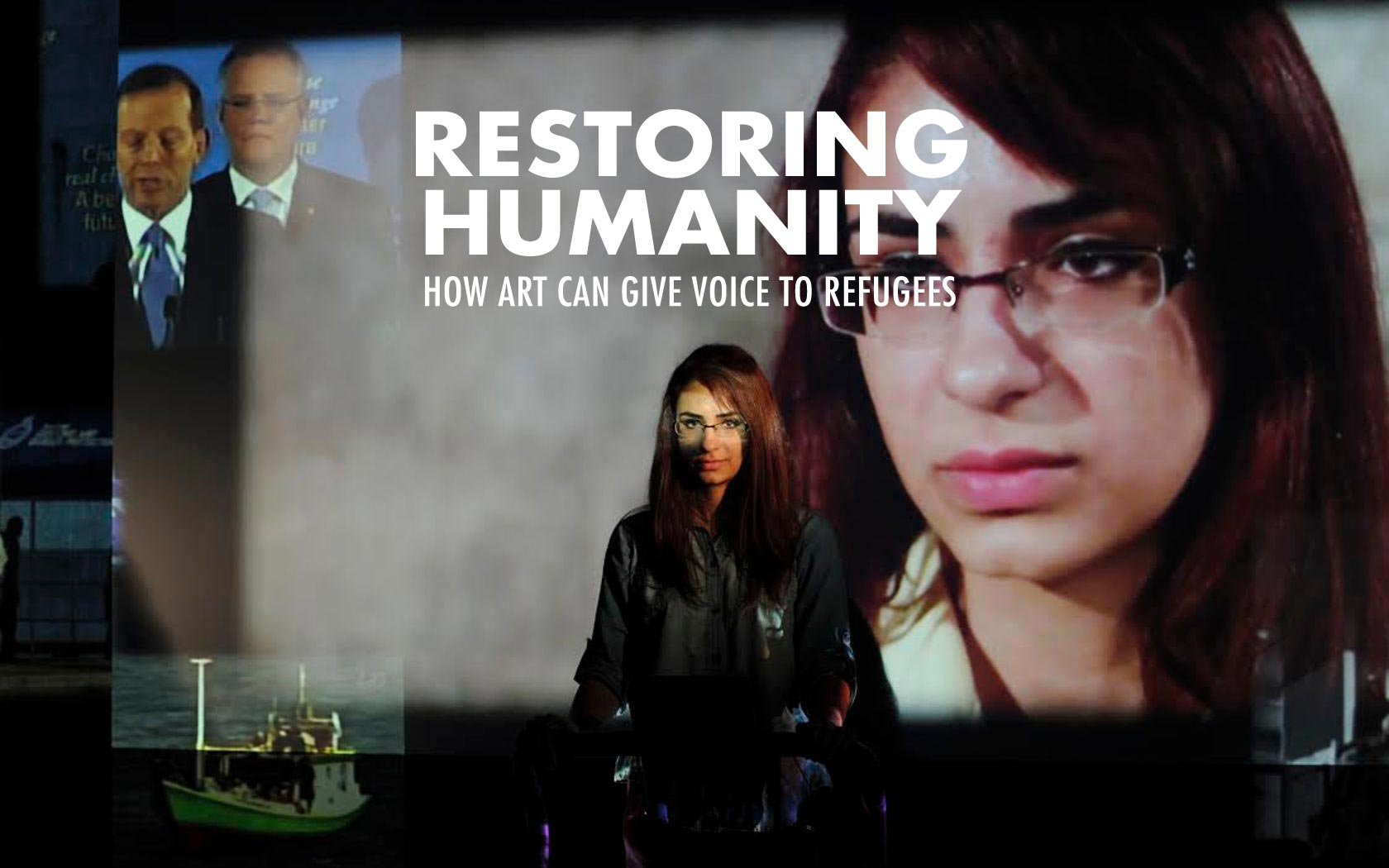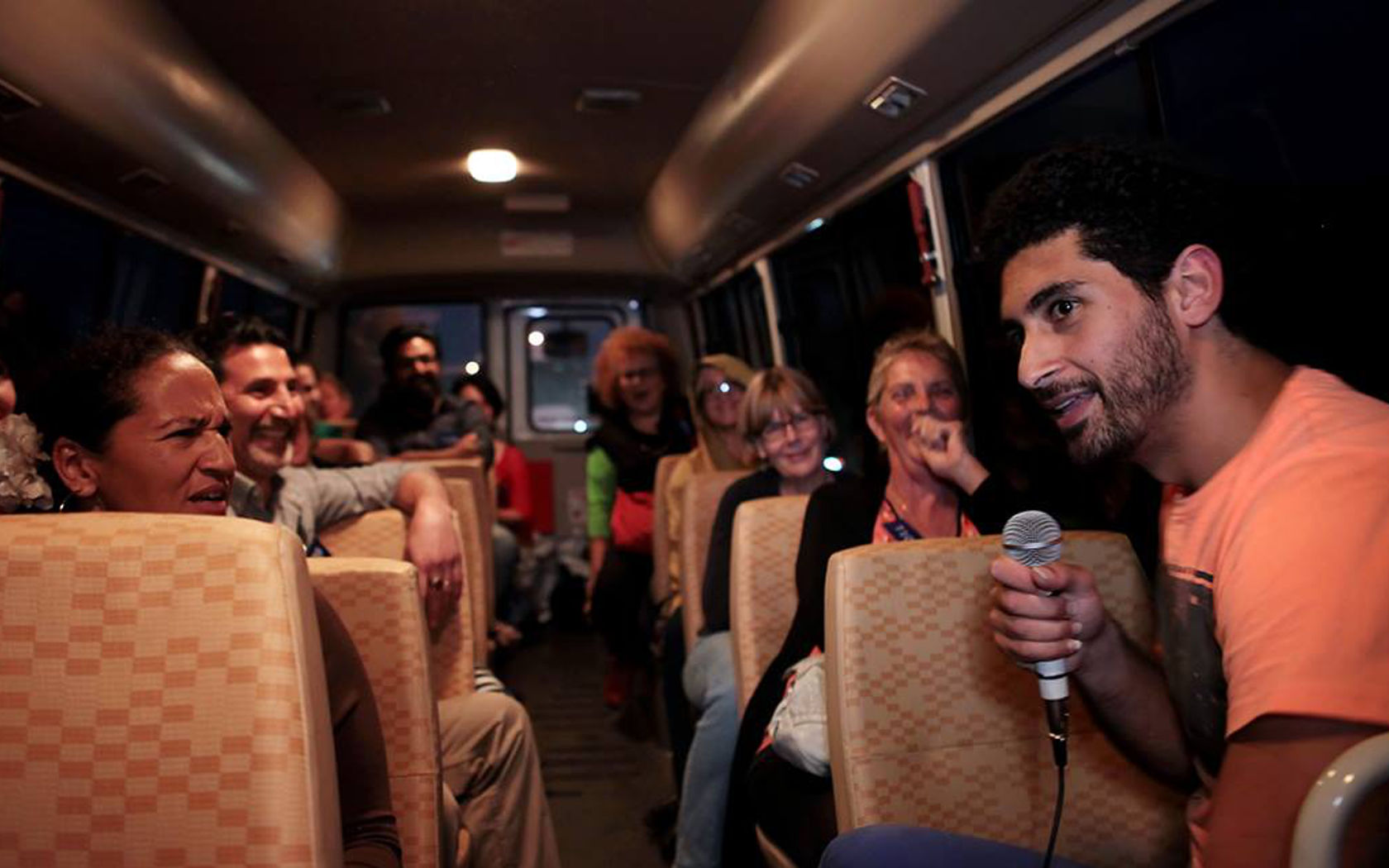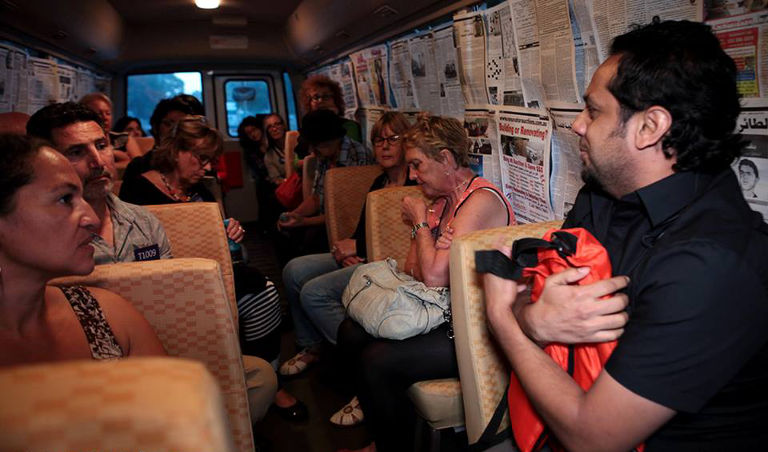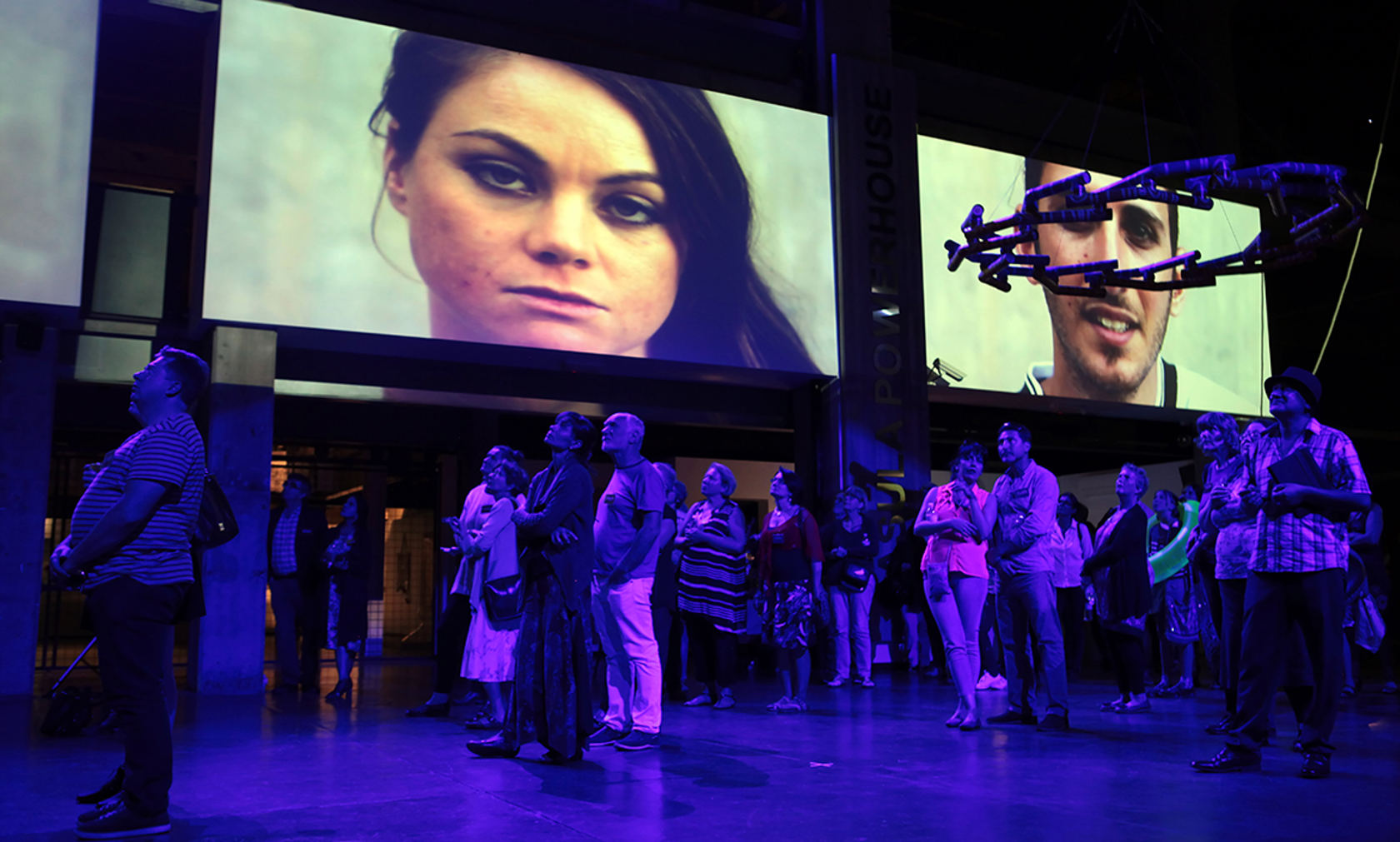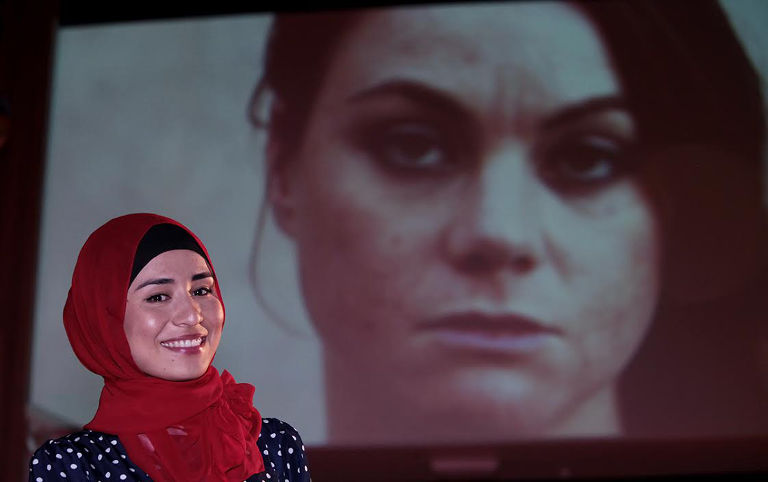Shokufa Tahiri was six years old when she fled the Taliban. In 1998 her father, a Hazara political activist targeted for execution, escaped his Afghani village to save his life and protect his family. The danger remained for Shokufa, her five siblings and mother. Covered by darkness, the Tahiri family bundled into the car of a people smuggler and set off for the Pakistani border. Shokufa was terrified when the car was stopped by “men with long beards, turbans around their heads, intimidating faces with Kalashnikovs in their arms”. Thanks to forged documents, the Tahiris were spared the bullets of the Taliban.
Shokufa is now a 22-year-old human rights activist and law student at the University of Western Sydney. She’s been reunited with her father, who made his way to Australia on a leaky boat. Her siblings are now students or graduates of engineering, medical science and IT.
The Hazara law student told her story to a captivated audience as part of a recent piece of immersive theatre in Sydney called Origin-Transit-Destination. The production, performed three times earlier this month, started in Auburn with a sound installation, continued on bus trips around Western Sydney and finished at Casula Powerhouse. Now the show’s creators are in talks with potential partners at the Sydney Festival and interstate, which may give audiences around the country a chance to hear the perspectives of people actually affected by Australia’s immigration policies.
Voices like Shokufa’s are conspicuously and deliberately absent from public debate. The federal government’s strategy of dehumanising and demonising refugees has a long history. In 2001, then Defence minister Peter Reith banned photographs which could “humanise or personalise” asylum seekers. More recently, government secrecy has shrouded those fleeing persecution, as they languish at sea or on Nauru and Manus Island. Fifteen years of portraying asylum seekers as the enemy has also shaped national attitudes.
While the government’s strategy has been widely discussed, the spaces of resistance receive less media attention. Creative producer of Origin-Transit-Destination Annmaree Dalziel points to the “countless networks, organisations, activists, writers and journalists who have the courage, commitment and ethical drive to keep realities of the lives of asylum seekers and refugees in public domains, despite the best efforts to hide away people in detention and obscure its national shame.” In concert with Director Sally Sussman, their theatre piece was motivated by what they feel is a moral obligation to rectify a national tragedy, using the stories, voices, humour and passion of asylum seekers themselves.
The performance begins in Auburn, Sydney: a council area with 57% of the population born overseas, 71% speaking a language other than English, and the highest density of refugees in the country. It’s also home to the biggest annual African festival in Australia, the Africultures Festival, whose beats throb in the park nearby as the audience queues for the show.
Like SBS TV’s Go Back to Where You Came From, Origin-Transit-Destination immerses Australians in experiences which intend to increase empathy for asylum seekers. The first of these is the sound installation of multi-media artist Khaled Sabsabi, set up in the basement of the Auburn Community Centre. Before entering we are told Khaled fled Lebanon as a teenager and travelled from bunker to bunker as part of that journey. Inside the basement ominous bass rumblings bounce off concrete walls bathed in blue fluorescent light and three perfectly spaced wooden chairs somehow hint at torture. The meaning is lost on some audience members, one remarking to her husband, “I don’t understand the significance of it”. For others though, like migrants Eddie and Ludwig, the work is a powerful reminder of time they spent in bunkers in the late 1980s during the Lebanese civil war.
The performance continues for the crowd of 50 with a series of disorienting trips around Western Sydney aboard buses with windows covered by Arabic newspapers. Rotating around the three buses, seven performers who fled Afghanistan, Iraq and Iran tell their stories of persecution and escape. Poet Jamal Ali Al Hallaq spent the equivalent of half his house to a get a fake passport to escape Iraq. As a young boy in Baghdad, Ram Abdulazeez witnessed his school friend’s kidnapping. After his family fled threats in Baghdad for Syria, Ram watched the bombing of his neighbour’s house and saw the man burn.
Mohammed Alenezi, currently seeking refugee status, endured eight metre swells on a life-threatening boat journey to Australia, giving up his life jacket for a terrified little girl.
Irani-born actor Osamah Sami tells an anecdote with a rather different tone. In 2005 his father, an Iraqi cleric under Islamophobic scrutiny, thought he’d bring light relief to the Australian Arabic community with Saddam the Musical. Performed in Arabic with an Iraqi accent, the show toured Sydney, Melbourne and regional Victoria to a great reception.
The welcome was somewhat colder from US Immigration officials, when Osamah and nine other Iraqis took the show to the US for the benefit of 200,000 Iraqis in Detroit. Arriving at San Francisco airport, his troupe of merry thespians faced 26 hours of interrogation and then deportation. Accused of being “too organised for a theatre company”, it didn’t help that Osamah’s Essendon Football Club members card was emblazoned with the slogan “proud member of the Bombers.”
–
Clambering out of the bus, beyond the newspapered windows, we realise we’ve arrived at Villawood Detention Centre. Towering walls conceal the human stories of suffering and courage so common among asylum seekers. In the car park the audience confronts a phalanx of guards and experiences the banality of evil enforcing the immigration system.
A young girl from the audience interrogates the guards: “What do you think about refugees being detained? Do you think it’s fair that they’re being locked up?”
“I don’t think anything,” one replies.
“It’s no good asking us our opinion, we’re here to do a job,” says another.
Hannah Arendt’s words come to mind: “The sad truth is that most evil is done by people who never make up their minds to be good or evil”.
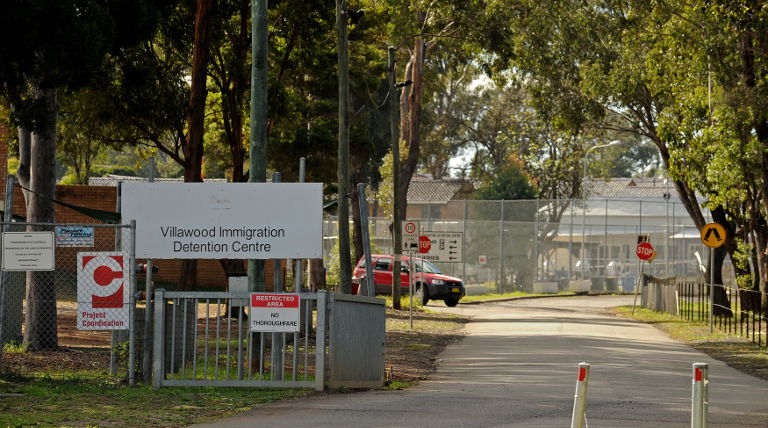
Photo by Greg Wood, via Getty (2010)
Back on the bus, Daniel Saed recalls being 13 years old in 2003, and ducking low in a car in war-torn Iraq. Fleeing from Baghdad, the Saeds had a pit stop at a petrol station. Daniel and his mum, brother and two sisters returned to the car only to see four armed militiamen storm the petrol station with his dad and driver still inside. The men bolted and the family just escaped with their lives.
Then it’s Shokufa’s turn to tell her story. Mid sentence she’s cut off by the distressed screams of a woman on the side of the road yelling, “Stop! Stop!”. The bus accelerates past her as one or two audience members join calls to stop and help. Someone else mutters, “Maybe one of the other buses will pick her up”. It’s a confronting moment of the performance, illustrating the bystander effect currently dominating Australia’s reaction to refugee policy.
The piece ends in the ‘Media Room’ at Casula Powerhouse with a barrage of images and sound bites of Howard, Rudd, Abbott and Co. The clips are smashed together into a confusing, aggressive and incoherent mess. Amongst the mish-mash assault of years of government misinformation emerge fragments of film of Kurdish teenager Shahla Shohani, who appears in the cover image of this piece. She recalls being packed with 150 other asylum seekers into an unseaworthy boat on the shores of Indonesia, buffeted by rain and wind and unable to go to the toilet for three nights. Stranded at sea, Shahla’s relief at being rescued by the Australian navy was soon washed away by the despair of being interned on Christmas Island.
One of the inspirations for Origin-Transit-Destination was Iraqi poet, activist and refugee Nashaa Alrubaee, who faced brutal treatment at Woomera and Villawood detention centres in the late 1990s. Part of the show’s development since 2010, Nashaa’s story took a tragic twist last year. Her son died travelling by boat to Australia and Nashaa passed away herself shortly afterwards, still searching for answers about her son’s death.
Shokufa Tahiri, the young human rights activist who fled the Taliban as a child, wants answers too: “Why is it that we are so selective in valuing human life? Why is it that we deliberately detain and punish the refugees, which costs us billions, in the mental illness factories that are the detention centres?” Engaging with historical, political and psychological realities can help us find answers to these important questions. But Origin-Transit-Destination is about taking the time to explore the other side of the story.
Director Sally Sussman saw the missing link in developing this extraordinary piece of theatre: “I realised that Nashaa and Jamal [who escaped Iraq on a fake passport] both are remarkable poets and writers and, as former asylum seekers, were the voices absent from the public discourse. They needed to be the core material of the work.”
Our treatment of asylum seekers is not just about the ways the Australian public has been conditioned by the government to ignore human rights abuses, and demonise innocent people. It’s also about the ways artists, activists and refugees themselves are resisting the strategy, by telling the stories of those who suffer from it. For many Australians, overcoming these policies means listening to leaders like Shokufa Tahiri, who explains her passion for speaking up:
“I want to take every chance to put a human face to refugees.”
–
Liam McLoughlin is a freelance writer who is sweet on activism and the arts. He blogs at Situation Theatre and tweets from @situtheatre
Feature image of Shahla Shohani, taken by Heidrun Lohr 013
